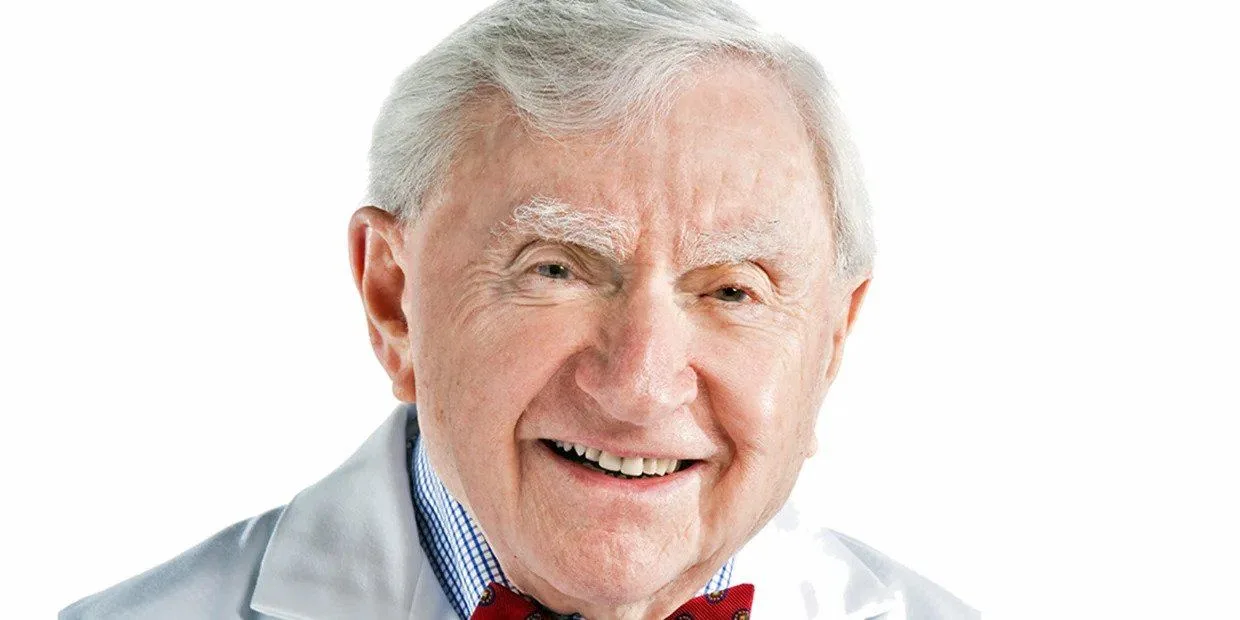The world’s oldest practicing doctor recently celebrated his birthday, turning 100 years old. Dr. Howard Tucker was born on July 10, 1922, in Cleveland. While he has stopped seeing patients, he isn’t officially retired as he spends his time teaching medical residents at St. Vincent Charity Medical Center in Cleveland, Ohio, twice a week.
Tucker lived through contracting COVID-19 – he got it during his 100th birthday celebration from one of his relatives, but he says he recovered quickly and felt fine. In addition to surviving COVID-19, Tucker has also lived through historical events including the Great Depression, World War II, and the fall of the Berlin Wall. Tucker has also yet to be diagnosed with heart disease, cancer, dementia and other major health disorders that people may develop as they age.
Speaking to TODAY, Tucker opened up about his habits and how he’s stayed so fit and healthy throughout the years.
A 100-Year-Old Doctor’s Guide To Living A Long and Healthy Life
“Heredity and family history of longevity is a healthy start. However, it must be supported by moderation of nutrition, alcohol, and happiness.” – Dr. Howard Tucker, Guinness World Records
Speaking to TODAY, Tucker acknowledged the role that genetics can play when it comes to living longer. His mother lived to the age of 84, while his father made it to 96. However, while family history may play a role in the state of your health, it’s not the only way you can protect your health span.
1. Don’t smoke
As a physician, Dr. Howard Tucker has seen first-hand the dire effects of smoking, and that may be why he’s never picked up a cigarette.

Photo by Andres Siimon on Unsplash
According to a study published in JAMA Network Open, the mortality rate among current smokers over the age of 65 was three times higher than people who had never smoked. Additionally, while former smokers did have a significantly lower mortality rate than current smokers, their mortality rate was still slightly higher than persons who had never ever smoked.
If you’re a smoker looking to quit the deadly habit, then the Mayo Clinic suggests the following ways to curb your tobacco cravings:
- nicotine replacement therapy (Nicotine patches, gums, and lozenges)
- Avoid triggers that encourage you to smoke, such as parties, bars, or the smoking section at the office
- Try exercising
- Adopt relaxation techniques like meditation and yoga
- Join a support group
2. Drink in moderation
If you’re interested in his drinking habits, Tucker revealed that he drinks alcohol socially and sometimes has a martini on Friday nights. While it would be advisable to stay clear of alcohol, some people enjoy a beverage here and now and there’s nothing wrong with that. However, moderation is the word of the day, and it appears that moderate drinking may help one reach longevity.
A study published in Age Ageing in 2020 set out to see which alcohol consumption habits would increase the probability of one reaching 90 years of age.
According to the findings, the highest chances of one reaching 90 years of age were found in those who consumed 0.5–1.5 glasses of alcohol a day. The study also noted that wine intake was positively associated with higher chances of reaching 90 in women, yet liquor was positively associated with longevity in men and inversely in women.
3. Eat in moderation
You are what you eat and if you eat well, then your body is sure to thank you. Dr. Tucker enjoys everything in moderation.
While moderation is necessary when it comes to your diet, there are dietary habits that you can adopt if you want to live a long and healthy life.

Photo by Louis Hansel on Unsplash
Courtesy of the Mediterranean Diet, which is seen as the healthiest diet in the world, consuming plenty of fruits, vegetables, bread, and other grains, potatoes, beans, nuts, and seeds is the best way to go. Might we also recommend cutting back on alcohol, red meat, as well as processed and fried foods? Also, olive oil is your best friend.
4. Exercise, exercise, exercise
Exercise is good for the soul and frankly, it’s one of the most effective ways to increase your life expectancy. Dr. Tucker has always been an active individual, and sometimes to a fault. In his late 80s, he broke his neck skiing, and yet he “came out of it totally intact,”.
Now, while his family has essentially forbidden him from skiing, he turns to snowshoeing, swimming, and jogging to keep active. When he’s in his home gym, he spends time on the treadmill, stationary bike, and “an old-fashioned NordicTrack, which is like skiing.”
Research has found that both swimming and jogging can enhance life expectancy, so it’s no surprise that Tucker is still so healthy and active after all these years.
5. Keep your brain active
“I look upon retirement as the enemy of longevity. I think that to retire, one can face potential shriveling up and ending in a nursing home. It’s fun staying alive and working… It’s delightful work. Every day I learn something new.”
While your body’s ability to do certain things may fade as you age, there’s no reason why you should let your brain whittle away.
Speaking to TODAY, Tucker says that if you are going to retire from work, the least you can do is engage in a hobby of some sort, as “you need a stimulus for the brain daily.”
Enjoyable hobbies that can keep you busy, and your brain active include gardening, journaling, and even jigsaw puzzles.
6. Keep learning
While Tucker received his medical degree in 1947, that doesn’t mean that he stopped learning. He still keeps up with the latest medical research by studying and reading. What’s more, at the age of 67, he passed the Ohio Bar Exam, after developing an interest for law and going to law school at night.
Additionally, after witnessing doctors retire as they found themselves technologically challenged, Tucker made it his mission to keep up with the latest gadgets,
“The whole world is full of computers, and they live by computers. If I want to stay in this world, I’m going to do it,” he said. Thanks to his grandson Austin, the good doctor has become much more versed in navigating new gadgets and apps.
7. Focus on the living
Happiness really is the secret to longevity, as optimistic people have been found to live longer. Recalling a story of a patient who was dealing with high levels of stress at the office, Tucker revealed that she suffered from a major stroke at age 42, which he believes was largely due to her work stress.
Tucker maintains that one needs to be happy in their job and in their domestic life, and it seems that he’s got a handle on that. He and his wife, a practicing psychiatrist at 89, have been married for 65 years, with four children and ten grandchildren.
While he may not know what the future brings, it’s clear that Dr. Tucker is all about embracing the moment and living in the now;
“I think I’ll live forever, knowing that it’s not real. But I feel that way. I never think of death. You die once, but you live daily… focus on the living.”




![women [longevity live]](https://longevitylive.com/wp-content/uploads/2020/01/photo-of-women-walking-down-the-street-1116984-100x100.jpg)










